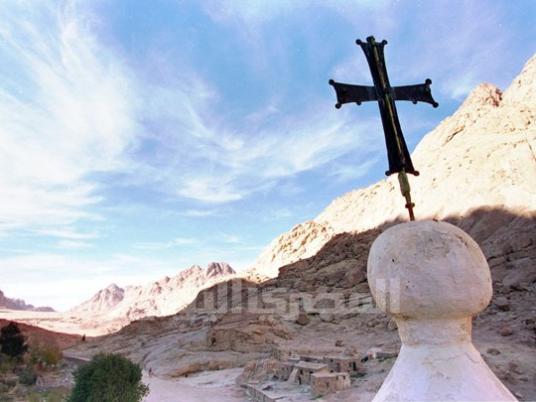Dublin–Earlier this month, when referring to the Egypt-Algeria fiasco, television commentator Amr Adeeb asked the rhetorical question: “Why do they hate us so much?” For him, as well as many Egyptians viewers, the answer is unclear. According to their narrative, Algerians should be grateful to Egypt. After all, as Adeeb said, “We freed them.”
This popular Egyptian narrative of Algeria’s road to independence, like the football controversy, runs far deeper than a mere war of words inflamed by the media. It highlights both Egyptian and Algerian perceptions of self-worth in their respective struggles and recollections of history. But what really took place during Algeria’s long and bloody struggle for independence from French colonialism? And did Egypt really play an integral role?
In 1954, the National Liberation Front (FLN) launched their campaign for Algerian independence. The country had come under French colonial rule following the invasion of Algiers in 1830. In the years preceding the campaign, the fabric of Algerian society altered radically. Modernization programs were promoted, particularly in agriculture, while various European settler communities found their way to Algeria. These European descendents would later be given French citizenship and came to be known as pieds noir, or black feet, after they fled the country following independence in 1962. Ahmed Ben Bella led the FLN in a campaign for independence that lasted for eight bloody years and is often termed a "guerrilla campaign" by Western commentators.
Egypt’s own history in the 1950s was linked to the Algerian liberation movement. The infamous Suez Crisis of 1956 was a monumental turning point in the existing global balance of power. There were a number of reasons behind the attack by Israel, Britain and France in October of that year, but for France the reasons were clear: General Andre Beaufre, who commanded French forces in the attack, claimed that “France would have fewer problems if Nasser was removed,” a clear reference to the Egyptian president’s ongoing support for Ben Bella and the FLN.
The Americans and British shared the French perspective. If Nasser succeeded in nationalizing the Suez Canal, as he had announced in July, the West would lose the Middle East and the FLN would have a new impetus to fight the French in Algeria. Records from archives and conversations further substantiate the French position, which linked Algeria and Egypt. In a conversation between US Secretary of State John Dulles and US President Eisenhower it was claimed, “The French would rather fight at the center of trouble–namely Egypt–rather than around the periphery of difficulty–namely Algeria.” The post-colonial fates of the Egyptian and the Algerian nations were inextricably intertwined. For France, Suez had always been about Algeria. Traditional narratives therefore argue that the Egyptian victory following Suez bolstered the FLN’s cause.
Revisionist histories in Algeria find the above narrative exaggerated and Franco-centric. While French participation in the Suez attack may have been related to events in Algeria, it is claimed that Egypt’s actual contribution to the Algerian resistance was minimal. Instead, it is argued that French propaganda bolstered claims of Egyptian support in an attempt to discredit the FLN. Furthermore, real and essential logistical support was provided by Morocco and Libya, not Egypt.
Fathi el-Dib, who advised President Nasser, however, provides evidence that arms and supplies were fed through Libya by Egypt in an attempt to avoid further international conflict. Regardless of whether one believes that Egypt sent supplies through Libya, the long and bloody struggle which finally led to Algerian Independence on 3 July, 1962, was a credit to the Algerian "guerrillas" and population. Their determination and victory was later aptly portrayed in the critically acclaimed 1966 film The Battle of Algiers by Italian director Gillo Pontecorvo.
For Algeria today, claims by Egyptians, explicitly or otherwise, that the War of Independence and subsequent victory in 1962 were in fact an "Egyptian" victory are highly offensive and distasteful.
This is not to claim that Egypt never supported Algeria. Revisionists acknowledge that Nasser lent physical and verbal support in the 1963 Sand Wars fought against Morocco. This concerned disputed claims over territory in Western Algeria. The difference here, in contrast to the War of Independence, was that the battle was against a fellow Arab nation. As a result, it does not feature so prominently in Egyptian narratives of relations with Algeria and the rhetoric of Arab brotherhood.
Indeed the ideals of pan-Arabism espoused by Nasser posed a further problem. One third of the Algerian population is not Arab and the rhetoric of brotherhood and unity, however unrealistic, alienated the Amazigh people and continue to do so with derogatory remarks aimed at Berbers. Moreover, in Algerian narratives of relations between the two nations, the 1967 War was a turning point. President Houari Boumediene, who overthrew Ben Bella in 1965, had been a contemporary of Nasser but later grew critical of the Egyptian president. The War of Attrition that ensued between Israel and Egypt was, according to Algerian narratives, based on tactics that Egypt had picked up from Algeria’s struggle against the French.
In the wider context of world events, the recent Algerian-Egyptian conflict over football is seemingly insignificant. But it highlights deeper historical roots. The narrative of Algerian independence and Egyptian assistance, whether it is exaggerated or not, epitomizes the importance of national memory and the struggle for self-worth of both Algerian and Egyptian independence movements in the post-colonial world.
In part two of this article, the challenges of Algerian-Egyptian relations in the post 1967 world will be discussed.




